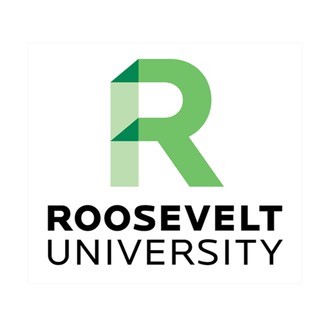|
Urban sustainability and environmental justice issues
|
Roosevelt UniversityRoosevelt University (RU) is a private university founded in 1945 with campuses in downtown Chicago on the shores of Lake Michigan and in nearby Schaumburg, a northwest suburb 30 miles from Chicago's Loop. A small university with just over 5,000 students, Roosevelt has a longstanding social justice mission while more recently becoming a local leader in sustainability education and urban environmental justice. In collaboration with community partners and institutions, and through transformational service learning as well as myriad internship opportunities, Roosevelt students live and learn in the heart of one of the world's most beautiful and culturally vibrant metro regions, home to eight million people as well as a constellation of protected natural lands known collectively as Chicago Wilderness.
|
Academic Offerings
- Sustainability Studies (SUST) (BA and Minor)
- The SUST program takes an interdisciplinary approach to place-based education in Chicago's diverse communities and ecosystems. Faculty provide students with hands-on opportunities to work on urban farms; canoe the Chicago River; conduct scientific research at world-class museums; restore woodland, prairie, and wetland ecosystems; work on transportation policy initiatives; create and edit sustainability-focused websites and blogs; participate in community-based environmental activism; and collaborate with faculty on campus sustainability planning, hands-on projects, and community outreach/service.
- Environmental Science (minor)
- Biology (BA, BS, and minor)
- Community Action and Development (MA, new for 2017), Hospitality Management (BS and MS), and Real Estate (MBA and MS)
Partner Organizations
- Eden Place Nature Center -- A former illegal dumpsite that was restored by community members into a center for hope, growth and change in the Fuller Park neighborhood on Chicago's South Side. Part nature center, part urban farm, Eden Place is a hub of environmental education and exemplar of urban nature. RU students contribute to EPNC's misson through SUST 350 Service & Sustinability, a service learning course held onsite each fall, as well as through university volunteer service days.
- Field Museum of Natural History -- One of the world's greatest natural history museums, the Field provides myriad internship and research opportunities in biodiversity, urban ecology, and conservation science. A special museum-based section of SUST 330 Biodiversity is offered by RU each year and pairs each student with a museum researcher for a semester. In 2016, the Museum launched a new Urban Ecology Field Lab program for college/graduate students in which students learn social and natural science field research techniques in Chicago's human and natural communities and complete team-based research projects during the summer.
- Friends of the Chicago River -- RU students have been undertaking urban canoeing adventures since 2009 with guides and naturalists from FCR, which is a longstanding environmental conservation group dedicated to the restoration of Chicago's namesake river. SUST 220 Water regularly features canoe trips on different stretches of the Chicago River, including the infamous Bubbly Creek that once drained the waste from thte Chicago Stockyards. Students learn about Chicago's industrial and natural history, and conduct tests of the river's water quality using chemical and biological field techniques.
- Institute of Cultural Affairs -- A vital force in Chicago's sustainability community, the ICA has mapped sustainability assets in all 77 of Chicago's official community areas -- a massive project undertaken in 2011-13 with the help of several Chicago colleges and universities, including Roosevelt -- and created a Sustainability Leaders Network that is active throughout the city.
- Midewin National Tallgrass Prairie -- The largest cointiguous open space (19,000) in the six-county Chicago metro region, Midewin ("Healing Land" in Potowatomi) represents the transformation of a former munitions factory into a long-term native grassland restoration that will result in the largest tallgrass prairie east of the Mississippi. Midewin is administered by the US Forest Service and provides nature-based recreation for citizens, research and internship opportunities for students, and abundant habitat for all manner of wildlife, including a bison herd re-introduced in 2015.

